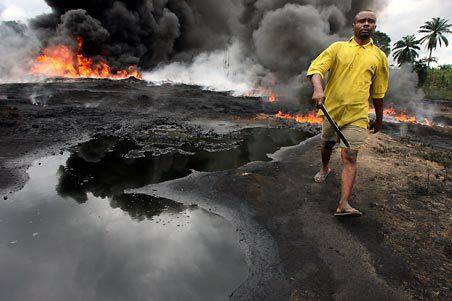
With repeated oil spills that have allegedly ruined their livelihoods and quality of life, the fishermen and farmers of the Ogale and Bille communities in Ogoniland, Nigeria, have been granted permission to sue oil and gas company Royal Dutch Shell and the Shell Petroleum Development Company of Nigeria, reports the Guardian.
RELATED: BROTHER REMEMBERS ENVIRONMENTALIST KEN SARO-WIWA’S LEGACY 20 YEARS AFTER HANGING
A man samples crude oil at the bank of a polluted river in Bidere community in Ogoniland in Nigeria’s delta region August 20, 2011. Picture taken August 20, 2011. REUTERS/Akintunde AkinleyeSince at least 1989, Ogale, which is located in Rivers State, has endured oil spills that Shell has allegedly neglected — even more than two decades later — to clean up.
The uncleaned oil spills have allegedly had a devastating impact on the residents of the area: for both of the fishing communities, fishing is no longer an option and even farmland has been adversely affected due to the pollution.
Consequently, London lawyers Leigh Day, who secured $83.5 million in damages last year against Shell for Nigeria’s Bodo community, brought Shell’s alleged neglect to the attention of the British court.
“It is scandalous that four year after the United Nations Environment Programme report, Shell is yet to clean up its oil in either Ogale or Bille,” Daniel Leader, Leigh Day solicitor partner, said. “Our clients’ patience has now run out and we intend to force Shell to act since it is clear they have no intention of doing so on their own.
“Given the extent of the damage, we believe that the cleanup costs for both communities will run into several hundred million pounds. The claims from the thousands of individuals affected by this pollution, could run into tens of millions of pounds given the impact on these communities.”
For its part, Shell maintains that the resulting pollution from oil spills is the fault of thieves and those who have sabotaged its operations.
Shell plans to challenge the lawsuit by questioning whether the English court has the jurisdiction to intervene in Nigerian matters.
Just last November, human rights activist and environmentalist Ken Saro-Wiwa (pictured) was  memorialized by his brother, Owens Wiwa.
memorialized by his brother, Owens Wiwa.
On November 10, 1995, Ken was hanged for campaigning for his people’s land and rights with his Movement for the Survival of the Ogoni People (MOSOP) organization against Shell.
Writing of the impact Shell had on Ogoniland, Owens says:
I know what it is like to live amidst Shell’s oil operations. Ogoniland rests on some 1,000 square kilometers in the Niger Delta region of Southern Nigeria. In 1958, oil was discovered in Ogoniland and, over the next several decades, Shell became comfortable in its occupation, taking our centuries old home as though it were their own. But, where the Ogoni had practiced caretaking and stewardship for this place that fed and provided for us, Shell left a trail of environmental devastation and terrible health impacts on the people still living there.
The United Nations Environment Programme (UNEP) report on the environmental devastation in Ogoni lays the blame of ecological waste of my community firmly at Shell’s door and reports that it may take 25-30 years to clean up our environment….
The slow poisoning of the land and water began almost immediately. There were constant oil spills and uncontrolled flares. Once thriving fishing areas grew too toxic to support even the smallest creatures and the mangroves — acting as nurseries for marine life in its infancy — which were choked at the roots. Their once bountiful leaves stripped away, leaving behind only skeletons.
Read the rest of Ogoniland’s and Ken’s harrowing experiences here.
SEE ALSO: Nigerian Government Unearths Nearly 24,000 Fake Workers in Payroll Audit










